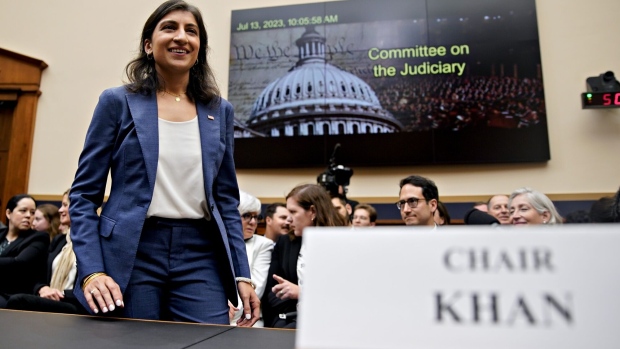Sep 25, 2023
Why Amazon’s Online Marketplace Drew FTC Scrutiny
, Bloomberg News

(Bloomberg) -- Lina Khan drew attention as a law student in 2017 with an article arguing for a broad re-imagining of US antitrust law. The company she focused on was Amazon.com Inc. Now Khan is chair of the US Federal Trade Commission, which has sanctioned Amazon for privacy lapses and is suing the company for allegedly exploiting its market power by overcharging merchants and steering consumers to its own products. Since much of US antitrust law is more than a century old, written for a very different economy, the FTC’s case against Amazon will test whether Khan’s modern-day interpretation holds up.
1. What business practices is the FTC investigating?
In a lawsuit filed on Sept. 26, the FTC and 17 states accused Amazon of engaging in illegal conduct to stifle competition. The suit says the company forces sellers on its platform to use its logistics and delivery services in exchange for prominent placement and punishes merchants that offer lower prices on rival sites. The FTC’s investigation started in 2019 during the administration of President Donald Trump.
2. What does Amazon say to all that?
Amazon says that the business practices outlined in the FTC’s complaint actually benefit customers and the online retail market and that the FTC’s case is “wrong on the facts and the law.” Amazon in the past has said that retail is a competitive market and that it competes with businesses both online and off. The company says it seeks to offer customers the best shopping experience, including the lowest prices. In response to a similar lawsuit by California’s attorney general, Amazon said consumers can still see higher-priced offers, even though the company does not highlight them.
3. Who are the third-party sellers on Amazon’s marketplace?
In addition to selling products directly, Amazon also acts as a kind of consignment store, offering third-party sellers a way to reach Amazon customers. This business mix makes Amazon a competitor as well as a business partner, and some independent merchants have alleged that Amazon uses its gatekeeper role to disadvantage competing merchants and even use its proprietary consumer data to manufacture competing products.
4. What is Amazon’s market share?
That depends on how you define the market, which will be an important question for the FTC’s antitrust lawyers to answer in their complaint. The FTC is expected to argue that Amazon’s marketplace is the most used website for buying a range of products and that it illegally ties access to its marketplace with use of its logistics service, which raises prices for consumers. Amazon accounts for 37.6% of all online retail in the US but only 3.5% of total US retail including online and offline businesses, according to Insider Intelligence. Amazon is six times bigger than its nearest online competitor, Walmart.com.
5. What other cases does the FTC have against Amazon?
The others are consumer protection cases. In May, Amazon paid $25 million to settle the agency’s complaint that Amazon’s Alexa-powered speakers illegally collected information about children under the age of 13 without parental consent. The company also paid $5.8 million to settle a case alleging that it didn’t take steps to protect the privacy of users of its Ring video doorbell. One month later, the FTC again sued Amazon in a consumer protection case, alleging the company duped consumers into signing up for Prime membership and deliberately made it hard to cancel. Amazon denies the allegations, and that suit is still unresolved. The FTC is separately investigating Amazon’s proposed $1.65 billion acquisition of iRobot Corp., maker of the Roomba automated vacuum cleaner, but the agency hasn’t filed a complaint in that case.
6. What other businesses does Amazon have?
In addition to the e-commerce site, fulfillment services, Prime video and music streaming, Amazon is also one of the world’s biggest providers of cloud computing via Amazon Web Services. Amazon also bought Whole Foods, making it a player in the grocery business.
7. What’s the significance of this case for antitrust law and for Lina Khan?
President Joe Biden’s decision to appoint Khan to lead the FTC was celebrated by antitrust advocates who want the US to return to the trust-busting of the early 20th century. This new school of legal thinking, beyond merely decrying industry consolidation, has raised specific complaints about the power that a handful of US companies has over the tech industry. In addition to her famous law school article, Khan worked on a House subcommittee investigating the issue, culminating in a report released in 2020 that helped inform a series of tech-focused antitrust bills that got traction in both chambers of Congress but failed to become law. Given this history, Amazon has called on Khan to recuse herself from the FTC’s investigation of the company, but two judges have ruled that there are no problems with Khan’s participation in cases filed in federal court.
©2023 Bloomberg L.P.





